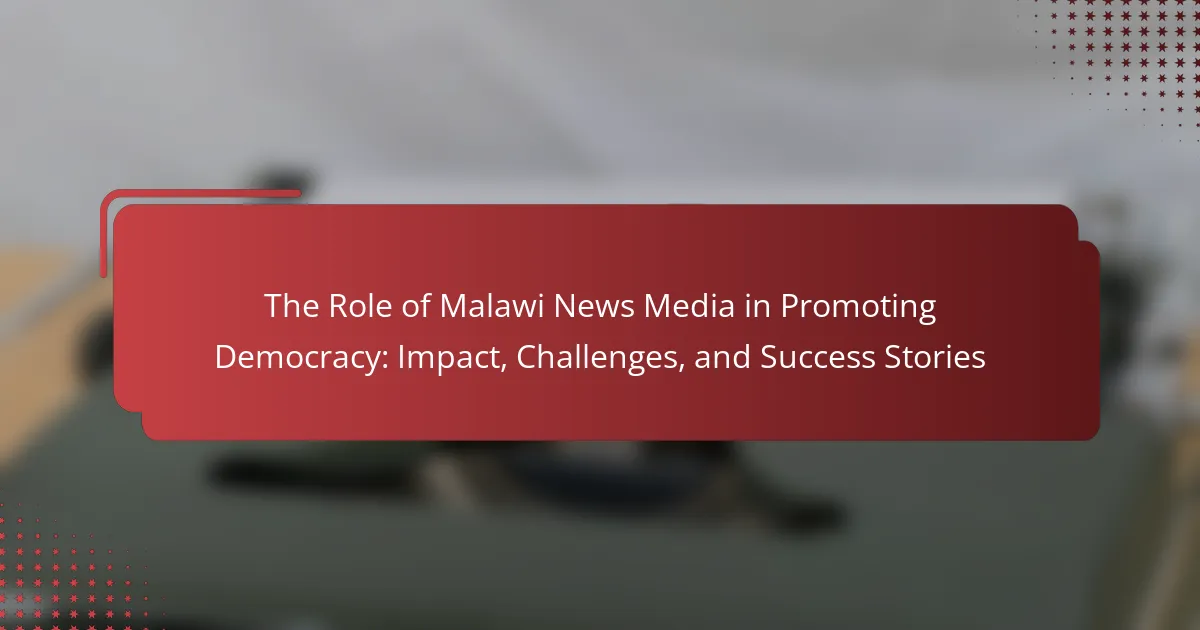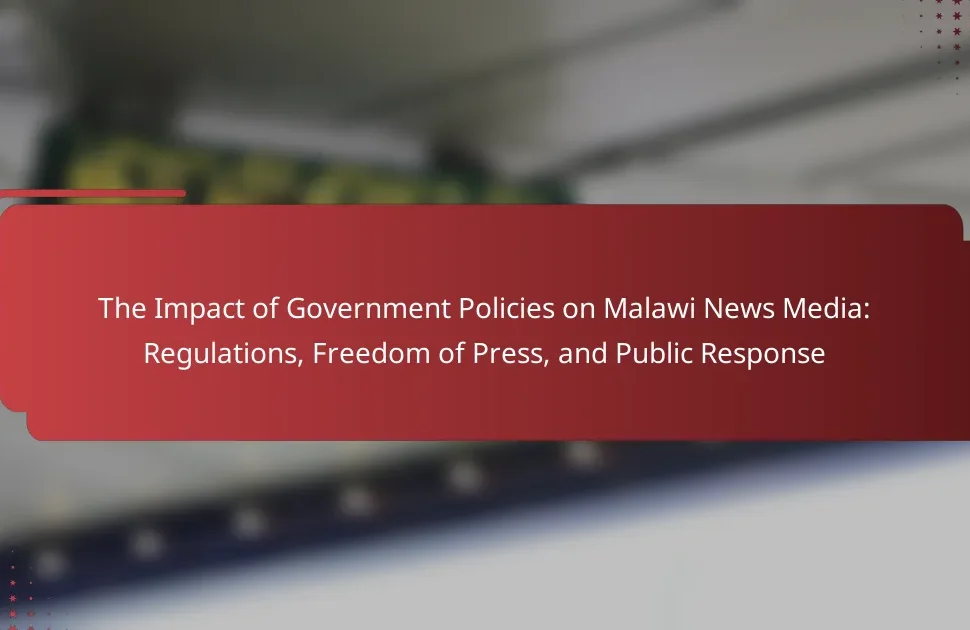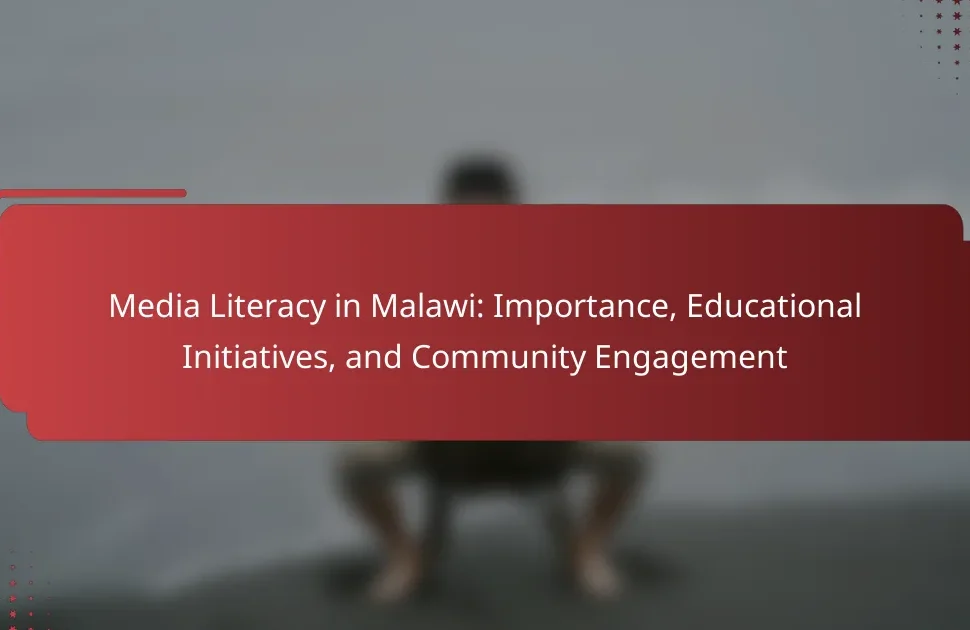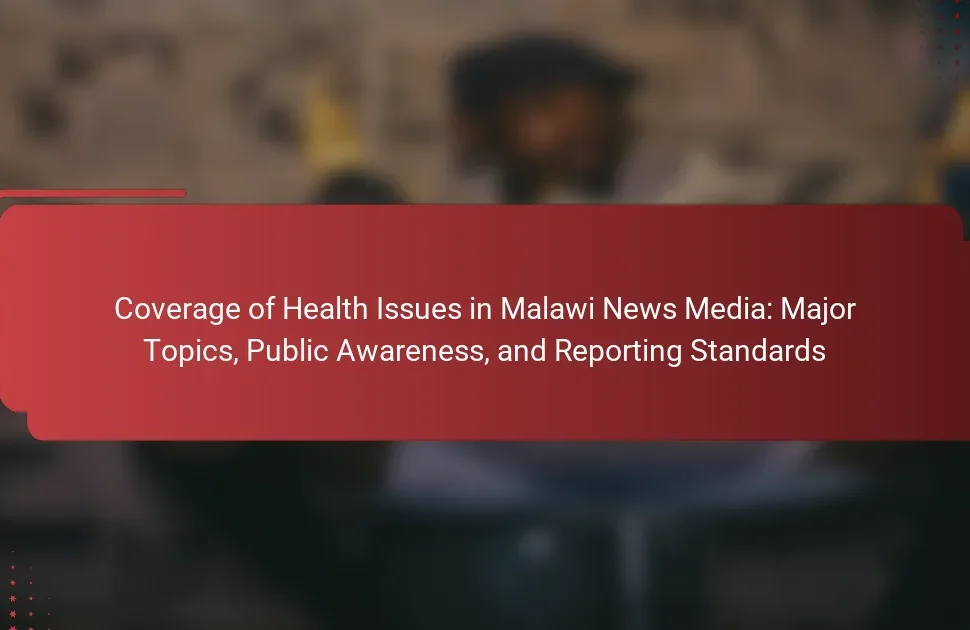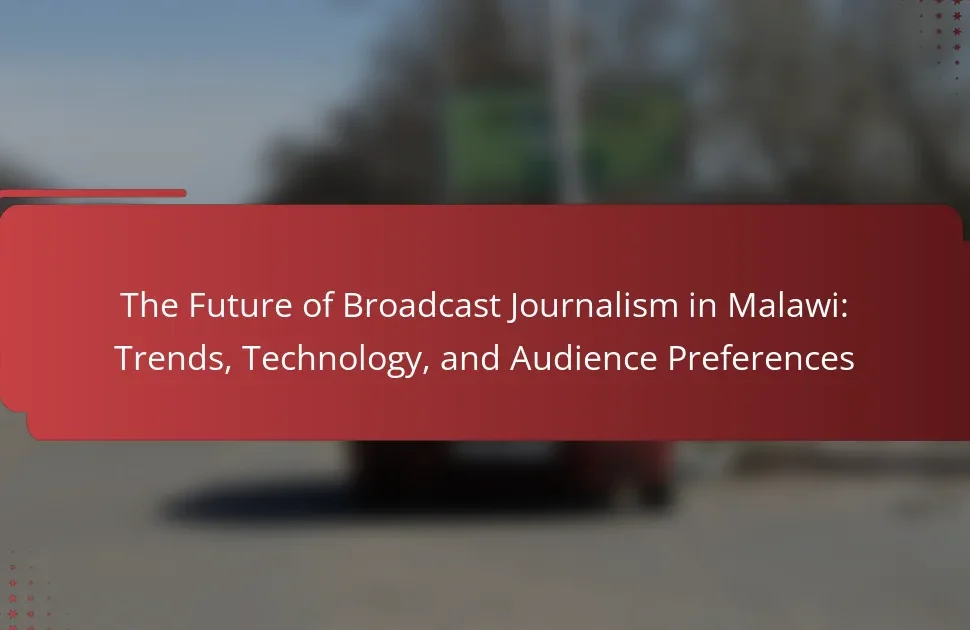The article examines the role of news media in Malawi as a vital entity in promoting democracy. It highlights how the media facilitates public discourse, informs citizens about political processes, and empowers voters through access to information. Investigative journalism is discussed as a tool for holding government officials accountable and exposing corruption. The article also addresses the challenges faced by the media and presents success stories, particularly emphasizing the media’s influence during the 2019 elections in fostering transparency and civic engagement.
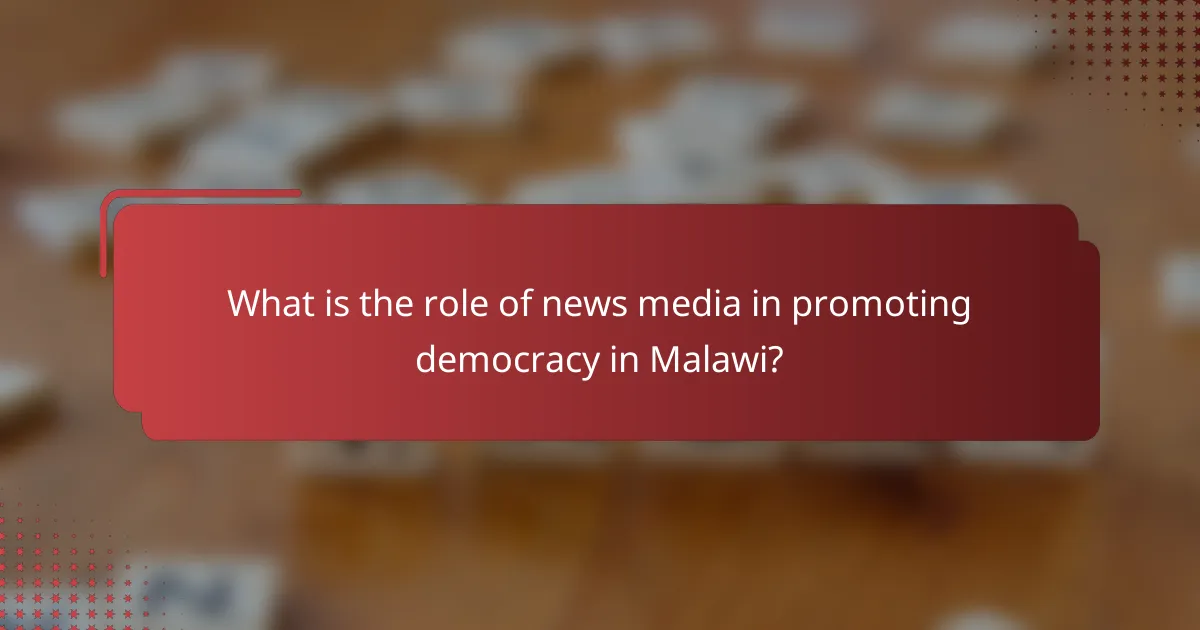
What is the role of news media in promoting democracy in Malawi?
The news media in Malawi plays a crucial role in promoting democracy. It serves as a platform for public discourse and debate. This media landscape informs citizens about political processes and governance. Access to information helps empower voters to make informed choices. Investigative journalism holds government officials accountable. It also exposes corruption and abuse of power. A vibrant media environment encourages civic engagement and participation. The 2019 elections highlighted the media’s impact in fostering transparency and fairness.
How does news media influence democratic processes in Malawi?
News media influences democratic processes in Malawi by facilitating public discourse and informing citizens. It provides a platform for political debate and discussion. This engagement allows voters to make informed decisions during elections. Additionally, news media acts as a watchdog, holding government officials accountable. Investigative journalism uncovers corruption and mismanagement, promoting transparency. According to the Media Institute of Southern Africa, media freedom is essential for democracy in Malawi. The rise of digital media has also expanded access to information, enhancing civic participation. Overall, news media plays a crucial role in shaping Malawi’s democratic landscape.
What are the key functions of news media in a democratic society?
The key functions of news media in a democratic society include informing the public, acting as a watchdog, and fostering public debate. News media disseminate information about government actions and policies. This helps citizens make informed decisions. They also investigate and expose corruption or malpractice. This watchdog role holds power to account. Additionally, news media provide a platform for diverse opinions. This encourages public discourse and civic engagement. Research shows that countries with robust media have higher levels of democratic participation. For instance, a study by the World Bank highlights the correlation between press freedom and civic involvement.
How does news media contribute to public awareness and civic engagement?
News media enhances public awareness and civic engagement by disseminating information on current events and issues. This information empowers citizens to make informed decisions. News outlets provide coverage of political processes, social issues, and community events. They serve as a platform for public discourse and debate. Research shows that increased media exposure correlates with higher voter participation rates. For instance, a study by the Pew Research Center found that 62% of voters reported following news closely before elections. This indicates that news media plays a crucial role in motivating civic involvement. Additionally, news media can spotlight underrepresented voices and issues, fostering a more inclusive public dialogue.
What impact has Malawi news media had on democratic governance?
Malawi news media has significantly influenced democratic governance by fostering public discourse and accountability. The media serves as a watchdog, exposing corruption and government inefficiencies. For instance, investigative journalism has led to the resignation of several public officials. Additionally, media platforms provide a space for diverse voices, enhancing civic engagement. Research from the Malawi Media Council indicates that increased media freedom correlates with higher voter participation rates. Furthermore, the media has played a crucial role in shaping electoral processes by informing citizens about their rights and responsibilities. This impact is evident in the coverage of the 2019 elections, which was marked by increased transparency and public awareness. Overall, the Malawi news media is vital in strengthening democratic practices and promoting good governance.
How has news media shaped political discourse in Malawi?
News media has significantly shaped political discourse in Malawi by providing a platform for public debate and information dissemination. It has facilitated access to diverse viewpoints, allowing citizens to engage with political issues. The media has played a critical role in holding government officials accountable through investigative journalism. This accountability fosters transparency in governance and encourages citizen participation in the democratic process.
Research indicates that media coverage during elections influences voter behavior and public opinion. For instance, the 2019 presidential elections saw increased voter turnout attributed to active media engagement and reporting. Furthermore, social media has emerged as a vital tool for political mobilization, especially among the youth. This shift has transformed traditional political communication, enabling real-time dialogue and feedback.
In summary, news media in Malawi has been pivotal in promoting informed political discourse, enhancing democratic engagement, and influencing electoral outcomes.
What role does investigative journalism play in holding power accountable?
Investigative journalism plays a crucial role in holding power accountable by uncovering corruption and abuses of power. It serves as a watchdog, exposing wrongdoing that may otherwise remain hidden. This type of journalism often involves in-depth research and fact-checking. For example, investigative reports can reveal financial mismanagement within government entities. Historical instances, such as the Watergate scandal, demonstrate its impact on political accountability. Investigative journalism empowers citizens by providing them with information to question authority. It fosters transparency and encourages public discourse on governance issues. In Malawi, investigative journalism has revealed significant cases of corruption, prompting governmental reforms. Thus, it is essential for a functioning democracy.
What challenges does the Malawi news media face in promoting democracy?
The Malawi news media faces significant challenges in promoting democracy. Limited access to information hampers journalistic efforts. Government censorship restricts freedom of expression. Journalists often face harassment and intimidation. Financial constraints affect media independence and sustainability. Political bias can compromise objectivity in reporting. Low literacy rates among the population hinder media engagement. These challenges collectively undermine the media’s role in fostering democratic discourse.
How do censorship and political pressure affect media operations?
Censorship and political pressure significantly restrict media operations. These factors limit the freedom of journalists to report on critical issues. In Malawi, media outlets often face government scrutiny and potential repercussions for unfavorable coverage. This environment can lead to self-censorship among journalists who fear losing their jobs or facing legal action.
For instance, the Media Institute of Southern Africa reported increased incidents of harassment against journalists in Malawi. Such conditions create a chilling effect, discouraging thorough investigative reporting. Political pressure can also influence the editorial decisions of media organizations, resulting in biased or incomplete news coverage.
In summary, censorship and political pressure undermine the media’s role in promoting democracy by stifling free expression and limiting access to information.
What are the implications of media ownership on editorial independence?
Media ownership significantly influences editorial independence. When media outlets are owned by large corporations or political entities, their editorial decisions may be compromised. Ownership can lead to biased reporting that aligns with the interests of the owners. This is evident in cases where owners pressure journalists to avoid certain topics. Research indicates that concentrated media ownership correlates with reduced diversity in viewpoints. For instance, a study by the Pew Research Center found that media consolidation often results in less critical coverage of powerful interests. Consequently, the implications of media ownership on editorial independence are profound, affecting the integrity and objectivity of news reporting.
What success stories highlight the effectiveness of Malawi news media?
Malawi news media has effectively contributed to democracy through various success stories. One notable example is the role of investigative journalism in exposing corruption. In 2014, the media uncovered the “Cashgate” scandal, revealing massive government fraud. This reporting led to public outcry and subsequent government accountability measures.
Another success story involves the media’s role in election monitoring. During the 2019 presidential elections, local media outlets provided extensive coverage, ensuring transparency and fairness. Their reports helped to inform citizens and fostered trust in the electoral process.
Additionally, the Malawi Broadcasting Corporation has successfully promoted civic education through programs that engage citizens on their rights. This initiative has empowered individuals to participate actively in democratic processes.
These examples illustrate the significant impact of Malawi news media in promoting democracy and accountability.
Which specific cases demonstrate the positive impact of media on democracy?
The positive impact of media on democracy is demonstrated in several specific cases. In Malawi, the media played a crucial role during the 2019 presidential elections. Investigative journalism exposed electoral fraud allegations, leading to a court case that resulted in a re-run of the elections. This case highlighted the media’s ability to hold power accountable.
Another instance is the coverage of government corruption scandals. Investigative reports by Malawian news outlets have led to public outcry and subsequent government action. For example, the “Cashgate” scandal was uncovered through diligent reporting, which prompted legal reforms and greater transparency.
Furthermore, media campaigns advocating for voter education have increased civic participation. Reports indicate that such initiatives have led to higher voter turnout in subsequent elections. The media’s role in disseminating information about candidates and policies has empowered citizens to make informed decisions.
These cases collectively illustrate how media serves as a watchdog, educates the public, and fosters accountability, thereby strengthening democratic processes in Malawi.
How have grassroots media initiatives contributed to democratic engagement?
Grassroots media initiatives have significantly enhanced democratic engagement by empowering local voices and fostering community participation. These initiatives provide platforms for marginalized groups to express their views. They facilitate access to information that is crucial for informed decision-making. For instance, community radio stations in Malawi have played a key role in disseminating political information. They engage citizens in discussions about governance and accountability. Studies show that increased access to local media correlates with higher voter turnout. Grassroots media also encourages civic activism by promoting awareness of rights and responsibilities. This engagement strengthens the democratic process by ensuring diverse perspectives are represented.
How can Malawi news media enhance its role in promoting democracy moving forward?
Malawi news media can enhance its role in promoting democracy by increasing investigative journalism. This practice fosters accountability among public officials. Strengthening fact-checking initiatives can combat misinformation. Collaborating with civil society organizations can amplify marginalized voices. Training journalists in ethical reporting improves the quality of news coverage. Expanding access to digital platforms broadens audience reach. Engaging in public forums encourages community participation in democratic processes. These strategies collectively support a more informed citizenry and a healthier democracy.
What strategies can be implemented to strengthen journalistic integrity?
Implementing strategies to strengthen journalistic integrity involves several key actions. First, establishing clear ethical guidelines is essential for journalists. These guidelines should outline standards for accuracy, fairness, and accountability. Second, continuous training and education for journalists can enhance their skills and understanding of ethical practices. Research from the Pew Research Center indicates that ongoing professional development leads to better reporting standards.
Third, promoting transparency within news organizations fosters trust. This includes disclosing sources and methods used in reporting. Fourth, encouraging a culture of accountability ensures that journalists are held responsible for their work. This can be achieved through internal reviews and public feedback mechanisms.
Fifth, fostering collaboration among media outlets can enhance credibility. Joint investigations and shared resources can lead to more thorough reporting. Finally, engaging with the audience through feedback can help journalists understand public concerns and improve their reporting. This multi-faceted approach can significantly enhance journalistic integrity within the media landscape.
How can collaboration between media organizations and civil society improve democratic outcomes?
Collaboration between media organizations and civil society can enhance democratic outcomes by fostering transparency and accountability. Media organizations can provide critical information to civil society, enabling informed public discourse. Civil society can amplify media messages, reaching wider audiences and increasing civic engagement. This partnership can lead to increased voter participation and awareness of democratic processes. For instance, in Malawi, joint initiatives have successfully mobilized communities around electoral issues. Research by the National Democratic Institute highlights that media-civil society collaborations can lead to improved governance and reduced corruption. These collaborations create a more informed electorate, essential for a thriving democracy.
What best practices can be adopted for effective news media in Malawi?
Adopting best practices for effective news media in Malawi involves ensuring accuracy, transparency, and diversity in reporting. News outlets should fact-check information before publication to maintain credibility. Journalists must uphold ethical standards and avoid sensationalism. Training programs can enhance skills in investigative journalism and digital reporting. Collaboration with civil society can foster accountability and community engagement. Utilizing multiple platforms, including social media, can broaden audience reach. Regular feedback from audiences can help media adapt to public needs. Establishing clear regulatory frameworks will support freedom of the press while ensuring responsible journalism. These practices can strengthen democracy and informed citizenry in Malawi.
The primary entity of this article is the news media in Malawi and its role in promoting democracy. The article examines how the news media serves as a platform for public discourse, informs citizens about political processes, and holds government officials accountable through investigative journalism. It highlights the impact of media on democratic engagement during elections, discusses challenges such as censorship and political pressure, and presents success stories that illustrate the media’s effectiveness in fostering transparency and civic participation. Additionally, it explores strategies for enhancing journalistic integrity and collaboration between media organizations and civil society to improve democratic outcomes.
